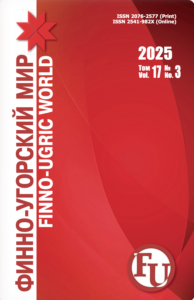DOI: 10.15507/2076-2577.011.2019.03.294-300
Linguistic means of expressing comic in the works by Victor Savin
Evgenii A. Tsypanov,
Doctor of Philology, Associate Professor, Deputy Director of
Institute of Language, Literature and History of the Komi Scientific Center, Ural Branch of the Russian Academy of Sciences
(Syktyvkar, Russia) tsypanov@mail.illhkomisc.ru
Galina K. Lisovskaya,
Research Fellow, Sector of Literary Studies,
Institute of Language, Literature and History of the Komi Scientific Center, Ural Branch of the Russian Academy of Sciences
(Syktyvkar, Russia), lisovskaja1330@gmail.com
Introduction. In Finno-Ugric Studies, as well as in Komi linguistics, the language of the founders of Komi literature, its features and artistic means of expression, its role in text formation are not well understood. Viktor Alekseevich Savin was not only the first Soviet Komi poet, playwright, composer and critic, but also one of the foundeers of the modern literary language. His works showed the great potential of his native language, laid down the tradition of creative writing, and became a role model for young poets and prose writers. The article analyzes the linguistic means of expressing the comic in his most popular works.
Materials and methods. The object of the study was a series of works by Savin, his poems, essays, and several plays, which are traditionally referred to as anti-religious in literary criticism. The authors used traditional methods of semantic analysis of vocabulary, component, and contextual analysis.
Results and Discussion. Not everything written by Savin is equally relevant and close to a modern reader, but many items of his poems, his dramas, and short stories are loved by readers and are still in demand. These are the anti-religious comedies “Rayin” (“In Paradise”), “Inastov lov” (“A Restless Soul”), “Wa Shyr” (“Water Rat”), and the poem “Arkirey” (“Bishop”). However, already in the post-perestroika years these works were not staged any longer at any of the state theaters of the Komi Republic.
Conclusion. Satirical poems, comedies, short stories, and essays by Savin have been checked by the time, and remained in the Komi literature’s golden fund, loved by readers and spectators. In connection with the 130th anniversary of the birth of Victor Savin, it is necessary to raise the question of reprinting his works and staging his plays.
Key words: Komi language; language of fiction; Victor Savin’s language; means of expressing comic and satirical
For citation: Tsypanov EA., Lisovskaya GK. Linguistic means of expressing comic in the works by Victor Savin. Finno-ugorskii mir = Finno-Ugric World. 2019; 11; 3: 294–300. (In Russian)






















